Orientation for Success: Reflective Learning and Gibbs Model
VerifiedAdded on 2023/06/08
|7
|1803
|353
Essay
AI Summary
This essay explores the concept of reflective learning in higher education, emphasizing its role in developing critical thinking and improving future performance through self-analysis and past experience reflection. It discusses Gibbs' reflective cycle, detailing its six stages (Description, Feelings, Evaluation, Analysis, Conclusion, and Action Plan) and how they aid in structured reflection. The essay also examines the importance of feed-forward and feedback processes in reflective learning, highlighting their impact on formative and summative assessments. The author reflects on a team assignment experience, recognizing the significance of communication skills and teamwork, and concludes that reflective learning is essential for personal and professional growth. This document is available on Desklib, a platform offering a wide range of study tools and solved assignments to support students.
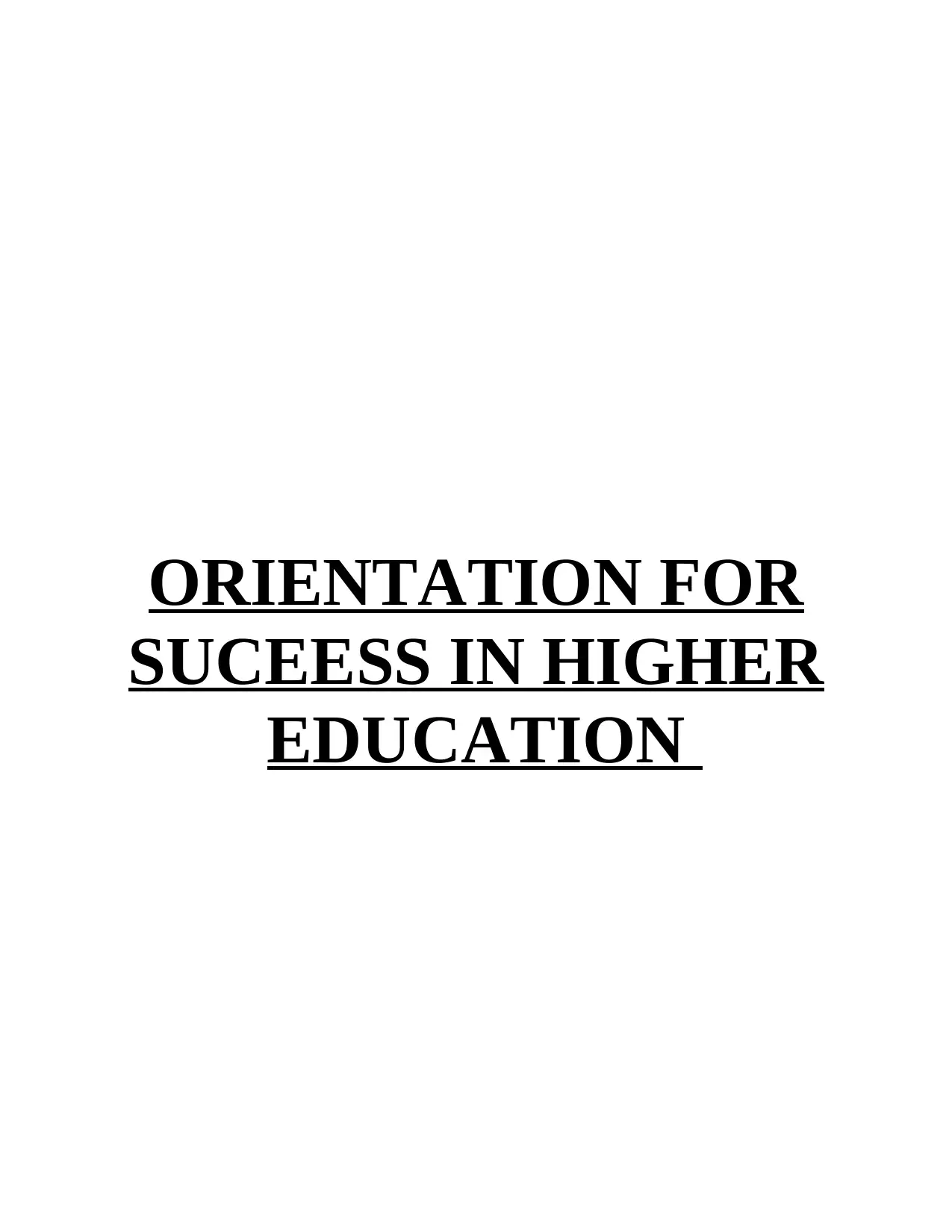
ORIENTATION FOR
SUCEESS IN HIGHER
EDUCATION
SUCEESS IN HIGHER
EDUCATION
Paraphrase This Document
Need a fresh take? Get an instant paraphrase of this document with our AI Paraphraser
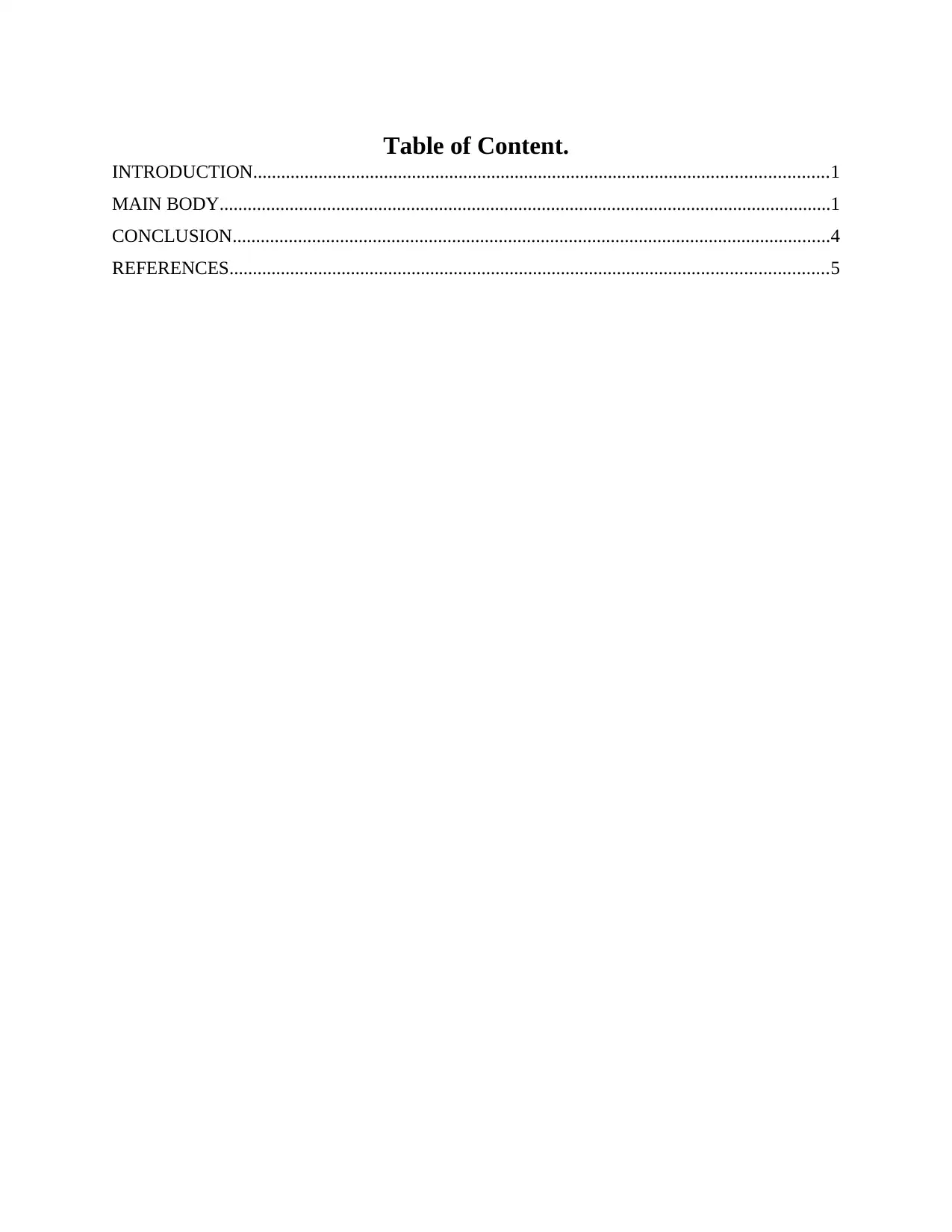
Table of Content.
INTRODUCTION...........................................................................................................................1
MAIN BODY...................................................................................................................................1
CONCLUSION................................................................................................................................4
REFERENCES................................................................................................................................5
INTRODUCTION...........................................................................................................................1
MAIN BODY...................................................................................................................................1
CONCLUSION................................................................................................................................4
REFERENCES................................................................................................................................5
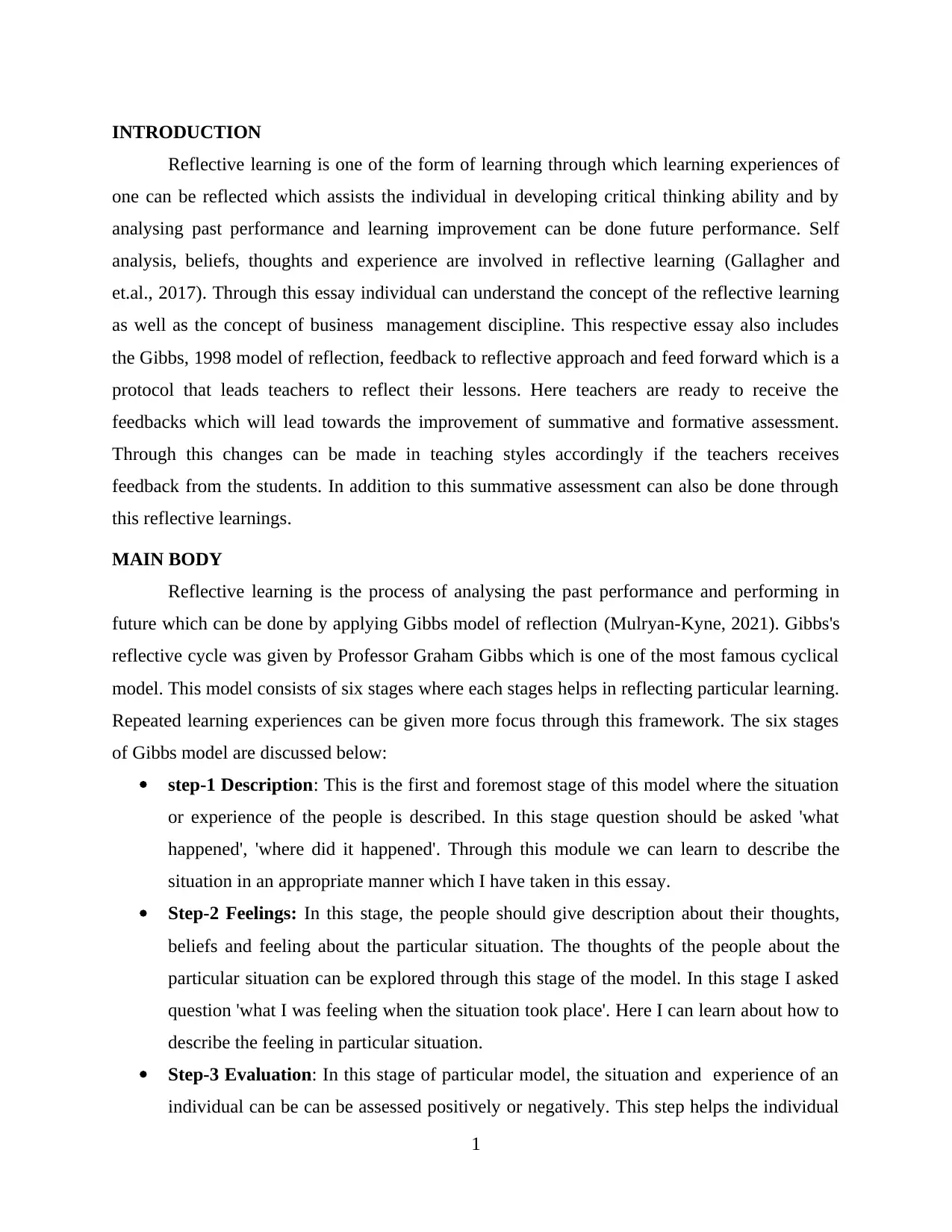
INTRODUCTION
Reflective learning is one of the form of learning through which learning experiences of
one can be reflected which assists the individual in developing critical thinking ability and by
analysing past performance and learning improvement can be done future performance. Self
analysis, beliefs, thoughts and experience are involved in reflective learning (Gallagher and
et.al., 2017). Through this essay individual can understand the concept of the reflective learning
as well as the concept of business management discipline. This respective essay also includes
the Gibbs, 1998 model of reflection, feedback to reflective approach and feed forward which is a
protocol that leads teachers to reflect their lessons. Here teachers are ready to receive the
feedbacks which will lead towards the improvement of summative and formative assessment.
Through this changes can be made in teaching styles accordingly if the teachers receives
feedback from the students. In addition to this summative assessment can also be done through
this reflective learnings.
MAIN BODY
Reflective learning is the process of analysing the past performance and performing in
future which can be done by applying Gibbs model of reflection (Mulryan-Kyne, 2021). Gibbs's
reflective cycle was given by Professor Graham Gibbs which is one of the most famous cyclical
model. This model consists of six stages where each stages helps in reflecting particular learning.
Repeated learning experiences can be given more focus through this framework. The six stages
of Gibbs model are discussed below:
step-1 Description: This is the first and foremost stage of this model where the situation
or experience of the people is described. In this stage question should be asked 'what
happened', 'where did it happened'. Through this module we can learn to describe the
situation in an appropriate manner which I have taken in this essay.
Step-2 Feelings: In this stage, the people should give description about their thoughts,
beliefs and feeling about the particular situation. The thoughts of the people about the
particular situation can be explored through this stage of the model. In this stage I asked
question 'what I was feeling when the situation took place'. Here I can learn about how to
describe the feeling in particular situation.
Step-3 Evaluation: In this stage of particular model, the situation and experience of an
individual can be can be assessed positively or negatively. This step helps the individual
1
Reflective learning is one of the form of learning through which learning experiences of
one can be reflected which assists the individual in developing critical thinking ability and by
analysing past performance and learning improvement can be done future performance. Self
analysis, beliefs, thoughts and experience are involved in reflective learning (Gallagher and
et.al., 2017). Through this essay individual can understand the concept of the reflective learning
as well as the concept of business management discipline. This respective essay also includes
the Gibbs, 1998 model of reflection, feedback to reflective approach and feed forward which is a
protocol that leads teachers to reflect their lessons. Here teachers are ready to receive the
feedbacks which will lead towards the improvement of summative and formative assessment.
Through this changes can be made in teaching styles accordingly if the teachers receives
feedback from the students. In addition to this summative assessment can also be done through
this reflective learnings.
MAIN BODY
Reflective learning is the process of analysing the past performance and performing in
future which can be done by applying Gibbs model of reflection (Mulryan-Kyne, 2021). Gibbs's
reflective cycle was given by Professor Graham Gibbs which is one of the most famous cyclical
model. This model consists of six stages where each stages helps in reflecting particular learning.
Repeated learning experiences can be given more focus through this framework. The six stages
of Gibbs model are discussed below:
step-1 Description: This is the first and foremost stage of this model where the situation
or experience of the people is described. In this stage question should be asked 'what
happened', 'where did it happened'. Through this module we can learn to describe the
situation in an appropriate manner which I have taken in this essay.
Step-2 Feelings: In this stage, the people should give description about their thoughts,
beliefs and feeling about the particular situation. The thoughts of the people about the
particular situation can be explored through this stage of the model. In this stage I asked
question 'what I was feeling when the situation took place'. Here I can learn about how to
describe the feeling in particular situation.
Step-3 Evaluation: In this stage of particular model, the situation and experience of an
individual can be can be assessed positively or negatively. This step helps the individual
1
⊘ This is a preview!⊘
Do you want full access?
Subscribe today to unlock all pages.

Trusted by 1+ million students worldwide
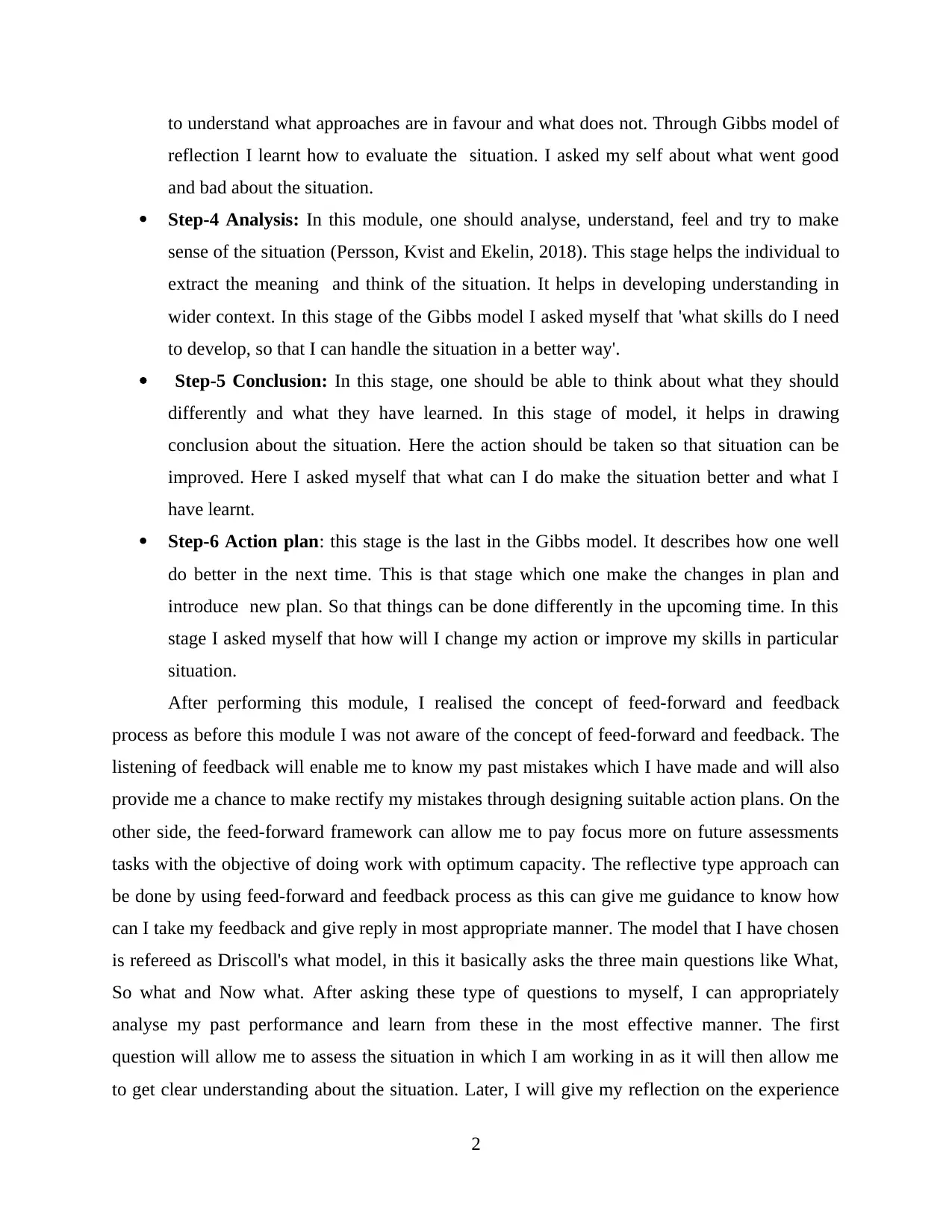
to understand what approaches are in favour and what does not. Through Gibbs model of
reflection I learnt how to evaluate the situation. I asked my self about what went good
and bad about the situation.
Step-4 Analysis: In this module, one should analyse, understand, feel and try to make
sense of the situation (Persson, Kvist and Ekelin, 2018). This stage helps the individual to
extract the meaning and think of the situation. It helps in developing understanding in
wider context. In this stage of the Gibbs model I asked myself that 'what skills do I need
to develop, so that I can handle the situation in a better way'.
Step-5 Conclusion: In this stage, one should be able to think about what they should
differently and what they have learned. In this stage of model, it helps in drawing
conclusion about the situation. Here the action should be taken so that situation can be
improved. Here I asked myself that what can I do make the situation better and what I
have learnt.
Step-6 Action plan: this stage is the last in the Gibbs model. It describes how one well
do better in the next time. This is that stage which one make the changes in plan and
introduce new plan. So that things can be done differently in the upcoming time. In this
stage I asked myself that how will I change my action or improve my skills in particular
situation.
After performing this module, I realised the concept of feed-forward and feedback
process as before this module I was not aware of the concept of feed-forward and feedback. The
listening of feedback will enable me to know my past mistakes which I have made and will also
provide me a chance to make rectify my mistakes through designing suitable action plans. On the
other side, the feed-forward framework can allow me to pay focus more on future assessments
tasks with the objective of doing work with optimum capacity. The reflective type approach can
be done by using feed-forward and feedback process as this can give me guidance to know how
can I take my feedback and give reply in most appropriate manner. The model that I have chosen
is refereed as Driscoll's what model, in this it basically asks the three main questions like What,
So what and Now what. After asking these type of questions to myself, I can appropriately
analyse my past performance and learn from these in the most effective manner. The first
question will allow me to assess the situation in which I am working in as it will then allow me
to get clear understanding about the situation. Later, I will give my reflection on the experience
2
reflection I learnt how to evaluate the situation. I asked my self about what went good
and bad about the situation.
Step-4 Analysis: In this module, one should analyse, understand, feel and try to make
sense of the situation (Persson, Kvist and Ekelin, 2018). This stage helps the individual to
extract the meaning and think of the situation. It helps in developing understanding in
wider context. In this stage of the Gibbs model I asked myself that 'what skills do I need
to develop, so that I can handle the situation in a better way'.
Step-5 Conclusion: In this stage, one should be able to think about what they should
differently and what they have learned. In this stage of model, it helps in drawing
conclusion about the situation. Here the action should be taken so that situation can be
improved. Here I asked myself that what can I do make the situation better and what I
have learnt.
Step-6 Action plan: this stage is the last in the Gibbs model. It describes how one well
do better in the next time. This is that stage which one make the changes in plan and
introduce new plan. So that things can be done differently in the upcoming time. In this
stage I asked myself that how will I change my action or improve my skills in particular
situation.
After performing this module, I realised the concept of feed-forward and feedback
process as before this module I was not aware of the concept of feed-forward and feedback. The
listening of feedback will enable me to know my past mistakes which I have made and will also
provide me a chance to make rectify my mistakes through designing suitable action plans. On the
other side, the feed-forward framework can allow me to pay focus more on future assessments
tasks with the objective of doing work with optimum capacity. The reflective type approach can
be done by using feed-forward and feedback process as this can give me guidance to know how
can I take my feedback and give reply in most appropriate manner. The model that I have chosen
is refereed as Driscoll's what model, in this it basically asks the three main questions like What,
So what and Now what. After asking these type of questions to myself, I can appropriately
analyse my past performance and learn from these in the most effective manner. The first
question will allow me to assess the situation in which I am working in as it will then allow me
to get clear understanding about the situation. Later, I will give my reflection on the experience
2
Paraphrase This Document
Need a fresh take? Get an instant paraphrase of this document with our AI Paraphraser
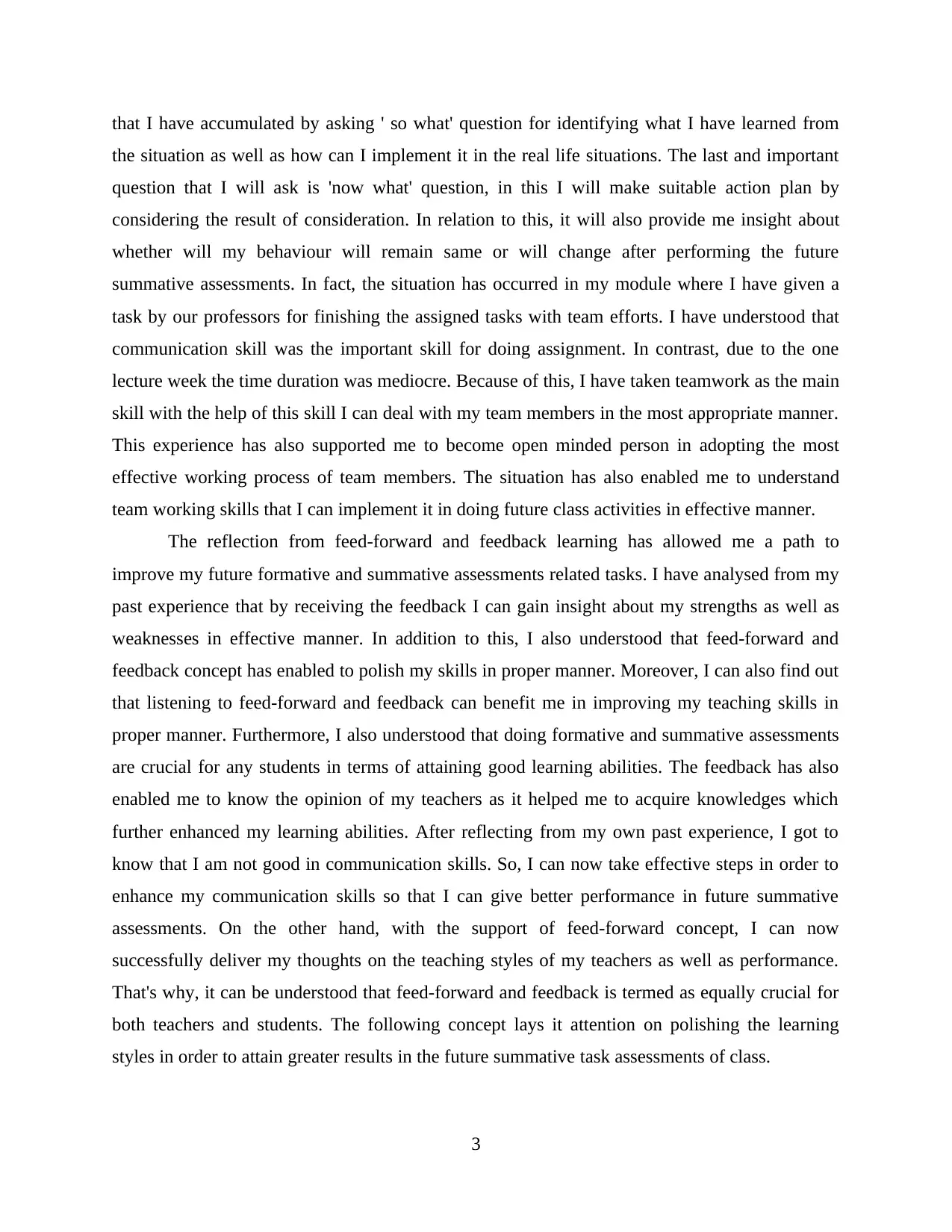
that I have accumulated by asking ' so what' question for identifying what I have learned from
the situation as well as how can I implement it in the real life situations. The last and important
question that I will ask is 'now what' question, in this I will make suitable action plan by
considering the result of consideration. In relation to this, it will also provide me insight about
whether will my behaviour will remain same or will change after performing the future
summative assessments. In fact, the situation has occurred in my module where I have given a
task by our professors for finishing the assigned tasks with team efforts. I have understood that
communication skill was the important skill for doing assignment. In contrast, due to the one
lecture week the time duration was mediocre. Because of this, I have taken teamwork as the main
skill with the help of this skill I can deal with my team members in the most appropriate manner.
This experience has also supported me to become open minded person in adopting the most
effective working process of team members. The situation has also enabled me to understand
team working skills that I can implement it in doing future class activities in effective manner.
The reflection from feed-forward and feedback learning has allowed me a path to
improve my future formative and summative assessments related tasks. I have analysed from my
past experience that by receiving the feedback I can gain insight about my strengths as well as
weaknesses in effective manner. In addition to this, I also understood that feed-forward and
feedback concept has enabled to polish my skills in proper manner. Moreover, I can also find out
that listening to feed-forward and feedback can benefit me in improving my teaching skills in
proper manner. Furthermore, I also understood that doing formative and summative assessments
are crucial for any students in terms of attaining good learning abilities. The feedback has also
enabled me to know the opinion of my teachers as it helped me to acquire knowledges which
further enhanced my learning abilities. After reflecting from my own past experience, I got to
know that I am not good in communication skills. So, I can now take effective steps in order to
enhance my communication skills so that I can give better performance in future summative
assessments. On the other hand, with the support of feed-forward concept, I can now
successfully deliver my thoughts on the teaching styles of my teachers as well as performance.
That's why, it can be understood that feed-forward and feedback is termed as equally crucial for
both teachers and students. The following concept lays it attention on polishing the learning
styles in order to attain greater results in the future summative task assessments of class.
3
the situation as well as how can I implement it in the real life situations. The last and important
question that I will ask is 'now what' question, in this I will make suitable action plan by
considering the result of consideration. In relation to this, it will also provide me insight about
whether will my behaviour will remain same or will change after performing the future
summative assessments. In fact, the situation has occurred in my module where I have given a
task by our professors for finishing the assigned tasks with team efforts. I have understood that
communication skill was the important skill for doing assignment. In contrast, due to the one
lecture week the time duration was mediocre. Because of this, I have taken teamwork as the main
skill with the help of this skill I can deal with my team members in the most appropriate manner.
This experience has also supported me to become open minded person in adopting the most
effective working process of team members. The situation has also enabled me to understand
team working skills that I can implement it in doing future class activities in effective manner.
The reflection from feed-forward and feedback learning has allowed me a path to
improve my future formative and summative assessments related tasks. I have analysed from my
past experience that by receiving the feedback I can gain insight about my strengths as well as
weaknesses in effective manner. In addition to this, I also understood that feed-forward and
feedback concept has enabled to polish my skills in proper manner. Moreover, I can also find out
that listening to feed-forward and feedback can benefit me in improving my teaching skills in
proper manner. Furthermore, I also understood that doing formative and summative assessments
are crucial for any students in terms of attaining good learning abilities. The feedback has also
enabled me to know the opinion of my teachers as it helped me to acquire knowledges which
further enhanced my learning abilities. After reflecting from my own past experience, I got to
know that I am not good in communication skills. So, I can now take effective steps in order to
enhance my communication skills so that I can give better performance in future summative
assessments. On the other hand, with the support of feed-forward concept, I can now
successfully deliver my thoughts on the teaching styles of my teachers as well as performance.
That's why, it can be understood that feed-forward and feedback is termed as equally crucial for
both teachers and students. The following concept lays it attention on polishing the learning
styles in order to attain greater results in the future summative task assessments of class.
3
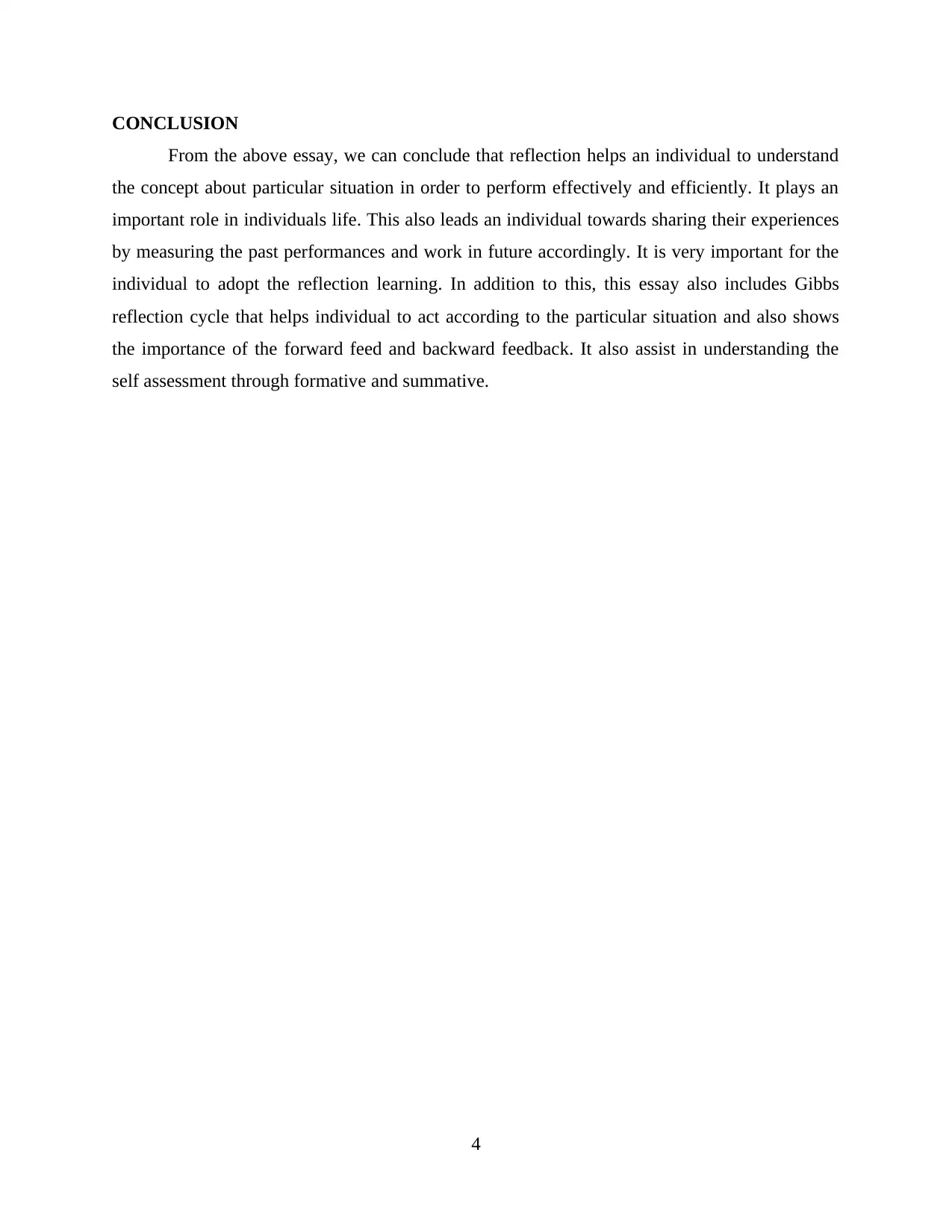
CONCLUSION
From the above essay, we can conclude that reflection helps an individual to understand
the concept about particular situation in order to perform effectively and efficiently. It plays an
important role in individuals life. This also leads an individual towards sharing their experiences
by measuring the past performances and work in future accordingly. It is very important for the
individual to adopt the reflection learning. In addition to this, this essay also includes Gibbs
reflection cycle that helps individual to act according to the particular situation and also shows
the importance of the forward feed and backward feedback. It also assist in understanding the
self assessment through formative and summative.
4
From the above essay, we can conclude that reflection helps an individual to understand
the concept about particular situation in order to perform effectively and efficiently. It plays an
important role in individuals life. This also leads an individual towards sharing their experiences
by measuring the past performances and work in future accordingly. It is very important for the
individual to adopt the reflection learning. In addition to this, this essay also includes Gibbs
reflection cycle that helps individual to act according to the particular situation and also shows
the importance of the forward feed and backward feedback. It also assist in understanding the
self assessment through formative and summative.
4
⊘ This is a preview!⊘
Do you want full access?
Subscribe today to unlock all pages.

Trusted by 1+ million students worldwide
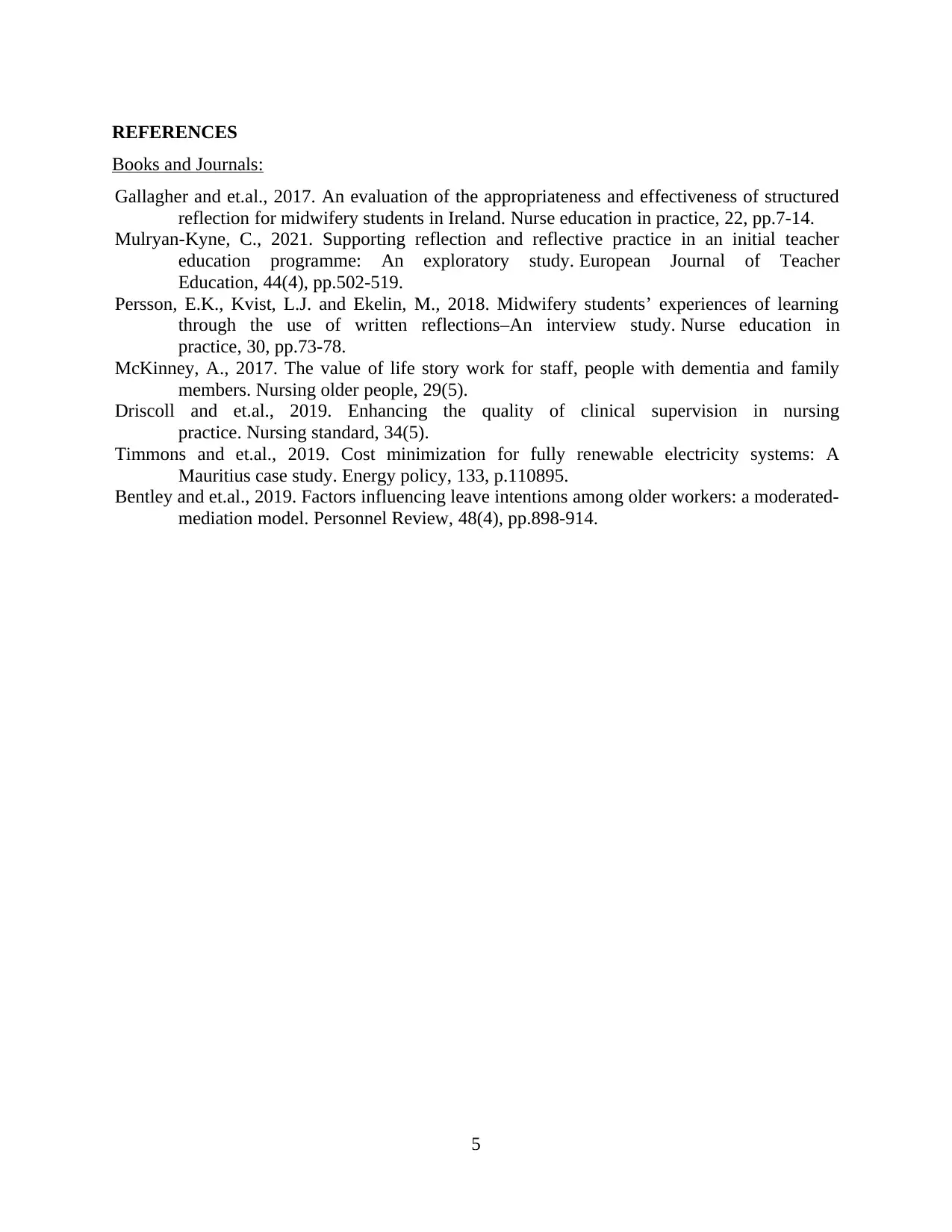
REFERENCES
Books and Journals:
Gallagher and et.al., 2017. An evaluation of the appropriateness and effectiveness of structured
reflection for midwifery students in Ireland. Nurse education in practice, 22, pp.7-14.
Mulryan-Kyne, C., 2021. Supporting reflection and reflective practice in an initial teacher
education programme: An exploratory study. European Journal of Teacher
Education, 44(4), pp.502-519.
Persson, E.K., Kvist, L.J. and Ekelin, M., 2018. Midwifery students’ experiences of learning
through the use of written reflections–An interview study. Nurse education in
practice, 30, pp.73-78.
McKinney, A., 2017. The value of life story work for staff, people with dementia and family
members. Nursing older people, 29(5).
Driscoll and et.al., 2019. Enhancing the quality of clinical supervision in nursing
practice. Nursing standard, 34(5).
Timmons and et.al., 2019. Cost minimization for fully renewable electricity systems: A
Mauritius case study. Energy policy, 133, p.110895.
Bentley and et.al., 2019. Factors influencing leave intentions among older workers: a moderated-
mediation model. Personnel Review, 48(4), pp.898-914.
5
Books and Journals:
Gallagher and et.al., 2017. An evaluation of the appropriateness and effectiveness of structured
reflection for midwifery students in Ireland. Nurse education in practice, 22, pp.7-14.
Mulryan-Kyne, C., 2021. Supporting reflection and reflective practice in an initial teacher
education programme: An exploratory study. European Journal of Teacher
Education, 44(4), pp.502-519.
Persson, E.K., Kvist, L.J. and Ekelin, M., 2018. Midwifery students’ experiences of learning
through the use of written reflections–An interview study. Nurse education in
practice, 30, pp.73-78.
McKinney, A., 2017. The value of life story work for staff, people with dementia and family
members. Nursing older people, 29(5).
Driscoll and et.al., 2019. Enhancing the quality of clinical supervision in nursing
practice. Nursing standard, 34(5).
Timmons and et.al., 2019. Cost minimization for fully renewable electricity systems: A
Mauritius case study. Energy policy, 133, p.110895.
Bentley and et.al., 2019. Factors influencing leave intentions among older workers: a moderated-
mediation model. Personnel Review, 48(4), pp.898-914.
5
1 out of 7
Related Documents
Your All-in-One AI-Powered Toolkit for Academic Success.
+13062052269
info@desklib.com
Available 24*7 on WhatsApp / Email
![[object Object]](/_next/static/media/star-bottom.7253800d.svg)
Unlock your academic potential
Copyright © 2020–2026 A2Z Services. All Rights Reserved. Developed and managed by ZUCOL.



